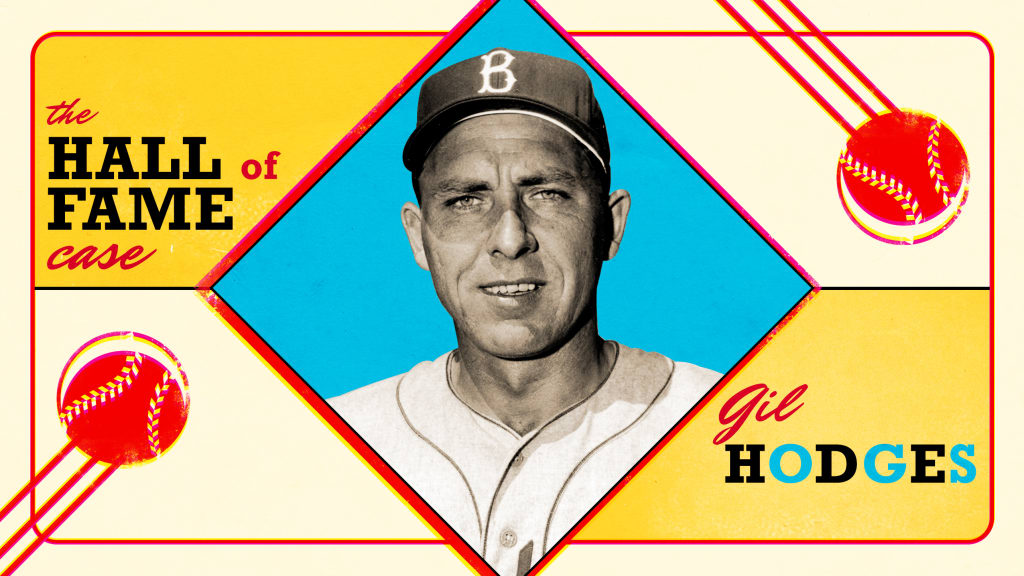Hodges left mark on Boys of Summer

Player: Gil Hodges
Years: 1943, '47-63 (MLB)
Career stats
Major League totals: .273/.359/.487, 1,921 H, 370 HR, 1,274 RBIs, 63 SB
BIO: In the late 1940s and ‘50s, the Brooklyn Dodgers were known as the Boys of Summer, and Hodges was one of the reasons for the team’s success in that era. Hodges was a quiet leader who let his bat and glove do the talking. He had eight All-Star appearances to back that up.
Hodges drove in 100 runs or more in a season seven times and often was among the league leaders in home runs, hitting 30 or more six times. On defense, Hodges was second to none in his era, winning Gold Gloves at first base during the first three years they were awarded at the tail end of his career (1957‐59).
Hodges helped guide the Dodgers to seven pennants and two World Series titles. Most of those World Series appearances were against the Yankees, but his best postseason was in 1959, when he hit .391 against the White Sox.
“If you take his statistics [during the Golden Days Era] and compare them to everyone who played during that time frame, I think he shines above everyone,” said Hodges’ son, Gil Jr., via telephone. “I would feel terrible if the committee judged him against someone who played in 1995 or 2010. Those statistics are different.”
BEST MOMENT: Game 7 of the 1955 World Series against the Yankees. The Dodgers were in enemy territory at Yankee Stadium and Hodges made it seem like he was playing at home. He drove in the only two runs of the game as the Dodgers won their first World Series title.
Hodges drove in the first run in the fourth inning when he singled to left field off left-hander Tommy Byrne, scoring Roy Campanella. Two innings later, Hodges swung at a pitch from right-hander Bob Grim and hit a sacrifice fly to deep center field, scoring Pee Wee Reese.
Three innings later, after 65 years in Major League Baseball, the Dodgers won their first and only World Series title in Brooklyn.
NOTABLE STATISTIC: Hodges may not have led the league in any statistical category in a single season, but his body of work in the 1950s spoke for itself. He led all Major League first basemen during that decade in home runs (310), RBIs (1,001), runs (890), hits (1,491) and games played (1,477). According to Baseball-Reference, over a 162-game average, Hodges hit .273 with 29 home runs and 100 RBIs.
Hodges posted an OPS+ of 120 or better in nine of 10 seasons from 1950-59, garnering MVP votes in seven of those years. By the time he retired after the 1963 season, Hodges led right-handed hitters in career home runs (370).
BEYOND THE STAT: Jackie Robinson was the first African-American player to break the color barrier in the Major Leagues in 1947. Reese has received much of the credit for helping Robinson adjust to life in the Major Leagues, but Hodges played a huge role as well. Hodges made sure that opponents didn’t mess with Robinson as they were approaching Robinson at second base.
“[Hodges] played a role that doesn’t get in the scorebooks, but he was very instrumental on the infield. I always felt that was overlooked,” former teammate Carl Erskine said. “His presence and the person that he was, his size, his strength was all part of it.”
According to Hodges Jr., his father and Robinson developed a mutual respect for one another.
“The respect they had for each other, not only as athletes, but as human beings,” he said. “I don’t know if anyone could have gone through what Jackie went through. It was every day at every ballpark without a break. My father was 6-foot-1, 210. But trust me when I tell you, you didn’t want to [mess] with him.”
When Hodges Sr., then the Mets' manager, died of a heart attack on April 2, 1972, two days shy of his 48th birthday, Robinson was devastated. During the funeral a few days later, Robinson sought out Hodges Jr.
“[Robinson] was crying,” said Hodges Jr., recalling the moment. “He puts his arms around me, kisses me and says to me, ‘Next to my son’s passing, this is the worst day of my life.’ I think that statement on its own would explain the relationship that they had.”
Bill Ladson has been a reporter for MLB.com since 2002. He covered the Nationals/Expos from 2002-2016.
